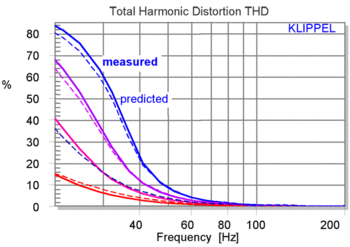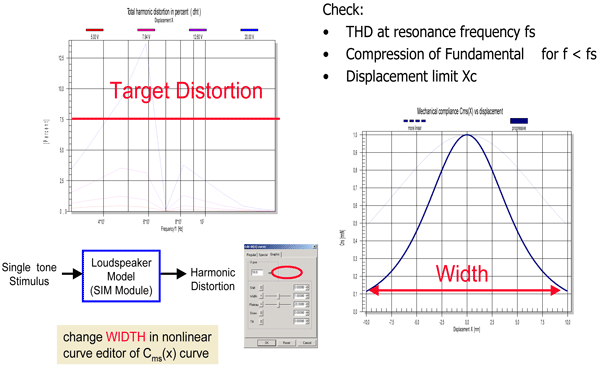Simulation (SIM)
Features and Benefits
- Determines maximal output
- Calculates voice coil, gap and magnet temperature
- Separates the effects of the individual nonlinearities
- Reveals dominant sources of distortion
- Shows mechanical and thermal load
- Helps to improve performance/cost ratio
- Saves time and cost in prototyping
This module performs a numerical prediction of the small and large signal performance of electro-dynamical transducers and complete systems using vented, sealed-box, band-pass enclosures and passive radiators. An extended model considers dominant nonlinearities of the driver (motor and suspension), the acoustical system (air compression, port losses, passive radiator suspension, Doppler effect), power dissipation and heat transfer using linear, nonlinear and thermal parameters of a real driver measured by the LSI module or fictitious parameters of a design choice. For a two-tone excitation signal, all electrical, mechanical and acoustical variables are calculated. The fundamental and distortion components (harmonics, intermodulation, dc component) are calculated by a spectral analysis. The SIM is a twin module of the DIS module to simplify the comparison of measured and predicted responses. Each nonlinearity in the system can be switched on and off to investigate its effect systematically. This reveals the dominant sources of distortion and gives valuable indications for driver optimization.
Specification
Requirements
Example
This figure illustrates the transformation of the target performance (permissible THD) into a transducer parameter (nonlinear shape of the nonlinear compliance Cms(x)) which is the basis for selecting the optimal driver for the system design. A nonlinear curve editor simplifies the generation of design choices.
Application Notes
Templates
Operation and/or object templates for this module are available when creating a new operation or object in dB-Lab. This provides application specific setups and standard conforms tests.
Please find details on templates in Application Note AN 1001.
Related Information
Other Modules of the R&D System
- 3D Distortion Measurements (DIS)
Module performs a series of steady-state measurements by using a single- or two-tone excitation signal varied in frequency and voltage
Literature and Papers
Standards
International Electrotechnical Commission
IEC 60268-5, IEC 60268-7, IEC 60268-21, IEC 60268-22, IEC 62458, IEC WD 63034
European Standards
BS EN 54-24, BS EN 50332
Audio Engineering Society
AES2, AES56


